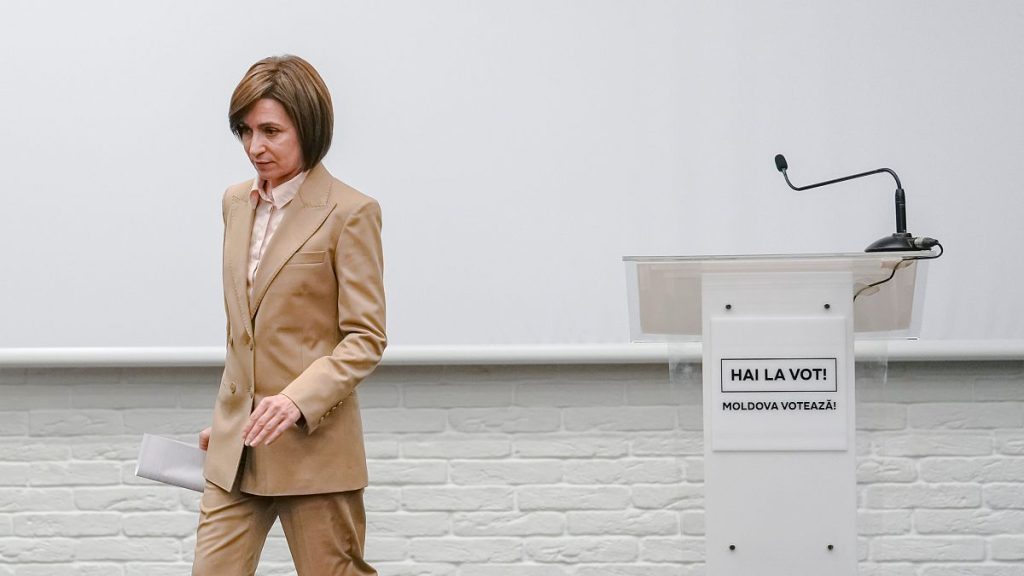Maia Sandu embarked on her second term as President of Moldova, a small Eastern European nation grappling with the reverberations of the ongoing war in Ukraine and navigating a complex geopolitical landscape. Her inauguration ceremony, held in Chisinau, marked a reaffirmation of the Moldovan people’s faith in her leadership and her unwavering commitment to a pro-Western trajectory. Sandu’s victory in the presidential runoff underscored a decisive choice for continued integration with the European Union, a stark contrast to the pro-Russian sentiment represented by her opponent. Her second term carries significant weight, as Moldova stands at a critical juncture in its history, seeking to solidify its democratic foundations and secure its future within the European community.
Sandu’s inaugural address resonated with a blend of gratitude and resolve. She acknowledged the challenges that have marked her first term, including the profound impact of the war in Ukraine, the economic turmoil, and the persistent threat of Russian interference. However, her message focused on the resilience and determination of the Moldovan people, highlighting their commitment to democratic values and their aspiration for a closer relationship with the European Union. Sandu’s emphasis on these themes served as a rallying cry for national unity and a reaffirmation of her administration’s strategic priorities. Her words echoed the hopes of a nation yearning for stability, prosperity, and a secure place within the broader European family.
Moldova’s pursuit of EU membership has taken center stage in its political discourse, and Sandu’s reelection serves as a powerful endorsement of this strategic objective. The country’s vulnerability to external pressures, particularly from Russia, has made closer ties with the EU a matter of paramount importance. Sandu’s leadership has been instrumental in advancing Moldova’s candidacy for EU membership, and her second term will be crucial in navigating the complexities of the accession process. The EU’s eventual acceptance of Moldova would represent a significant geopolitical victory, not only for Moldova itself but also for the broader European project, as it would demonstrate the enduring appeal of democratic values and the EU’s commitment to supporting its neighbors in the face of external threats.
The presidential election, which culminated in Sandu’s decisive victory, was not without its share of controversy. Allegations of Russian interference, voter fraud, and intimidation cast a shadow over the democratic process, underscoring the challenges facing Moldova as it strives to consolidate its democratic institutions. The claims of Russian meddling highlight the Kremlin’s ongoing efforts to exert influence in the region and undermine the aspirations of countries seeking closer ties with the West. Sandu’s victory, despite these challenges, represents a testament to the resilience of Moldovan democracy and the determination of its citizens to choose their own path.
Sandu’s second term will be defined by the need to address a multitude of complex and interconnected challenges. The ongoing war in Ukraine continues to cast a long shadow over Moldova, posing significant security and economic risks. The influx of Ukrainian refugees, while demonstrating Moldova’s humanitarian commitment, has also strained the country’s resources. Moreover, the energy crisis, exacerbated by the war, has further compounded the economic difficulties faced by ordinary Moldovans. Addressing these immediate challenges will require deft diplomacy, effective resource management, and continued support from international partners.
Looking beyond the immediate crises, Sandu’s second term will also require a focus on strengthening Moldova’s democratic institutions, promoting economic development, and tackling the pervasive issue of corruption. These long-term goals are essential for building a more resilient and prosperous Moldova, capable of withstanding external pressures and fulfilling the aspirations of its citizens. Sandu’s leadership will be crucial in navigating these complex challenges and charting a course towards a more secure and prosperous future for Moldova within the European community. Her mandate represents a clear affirmation of the Moldovan people’s desire for a democratic, European future, and her second term will be a critical period in determining whether this vision can be realized. The road ahead will undoubtedly be fraught with difficulties, but Sandu’s unwavering commitment to democratic values and her determination to lead Moldova towards closer integration with the EU offer a beacon of hope for the future.

